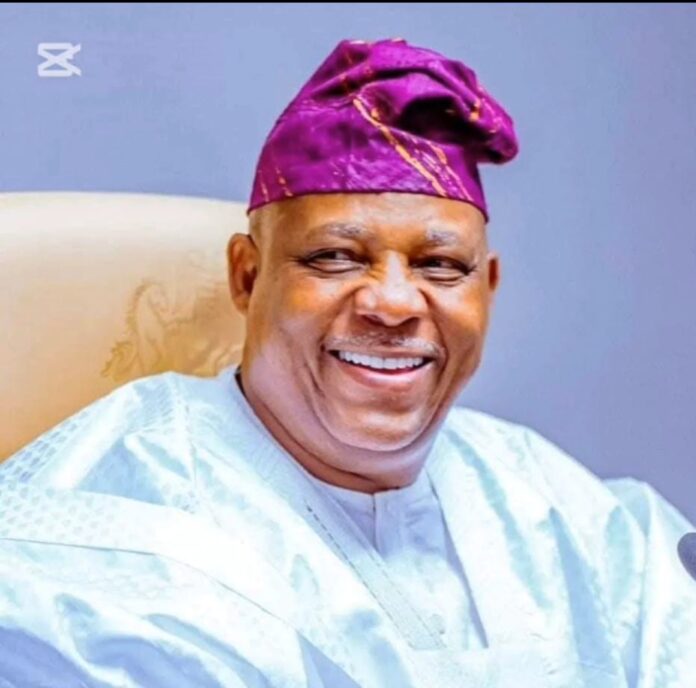By: Dr. James Bwala
The not mentioning of Vice President Kashim Shettima by some speakers at the Northeast Stakeholders Meeting in Gombe should not be interpreted as a lack of endorsement for his re-election alongside President Tinubu. Rather, this strategy reflects nuanced political maneuvering within the regions. Despite some delegates naming Shettima explicitly, this did not contradict the broader consensus supporting the Tinubu-Shettima ticket for 2027. In fact, Governor Babagana Umara Zulum’s open endorsement of both figures underscores the region’s unified backing. Such strategic ambiguity may serve to balance regional interests and manage intra-party dynamics while maintaining public solidarity.
The absence of overt endorsements during certain speeches has fueled speculation regarding Shettima’s political fate; however, these speculations overlook key contextual factors. Politicians and stakeholders are known to employ tactical speech-making to maximize political leverage without fracturing alliances prematurely. Consequently, the overall posture at the meeting reflected a deliberate approach designed to reinforce Shettima’s candidacy indirectly while affirming loyalty to President Tinubu’s leadership.
The body language and the love shown by stakeholders and party youths for the VP is a clear message of endorsement. Therefore, the endorsement of Vice President Kashim Shettima by the Northeast All Progressives Congress (APC) stakeholders for the 2027 elections underscores his broad-based support within a critical geopolitical zone in Nigeria. This backing, articulated during a consultative meeting in Gombe, reflects confidence in Shettima’s leadership and partnership with President Bola Tinubu to advance Nigeria’s developmental agenda. The Northeast APC stakeholders specifically highlighted achievements under their administration in health, education, and empowerment initiatives as evidence of purposeful governance that merits continuity.
Such regional endorsements are pivotal in Nigeria’s complex political landscape, where ethno-regional considerations influence electoral dynamics. The Northeast’s support for Shettima counters opposition from other zones seeking alternative candidates but demonstrates his resonance with constituents familiar with his contributions to security and socio-economic progress. Consequently, this endorsement not only legitimizes Shettima’s role as Tinubu’s running mate but also symbolizes a unified front aimed at delivering transformative leadership for Nigeria’s future. This regional backing is particularly significant given the historical context of political alliances in Nigeria, where securing support from diverse regions is crucial for electoral success.
The endorsement signifies a strategic alignment within the APC, setting a precedent for other geopolitical zones to rally behind a leadership team that has demonstrated its capability to address Nigeria’s multifaceted challenges. This dynamic underscores a political strategy that not only consolidates regional support but also enhances the party’s national appeal. This endorsement from the Northeast serves as a testament to Shettima’s ability to bridge regional divides and foster a cohesive national agenda that aligns with the broader aspirations of the Nigerian populace. This strategic move not only consolidates Shettima’s influence within the region but also strengthens the APC’s electoral prospects by showcasing a leadership team that has consistently prioritized national unity and development.
The Northeast’s endorsement is a calculated move that further consolidates the party’s electoral strategy, ensuring that Shettima and Tinubu are positioned as the candidates best equipped to lead Nigeria toward sustained growth and stability. Such a strategic endorsement not only bolsters the legitimacy of the Tinubu-Shettima ticket but also reinforces a narrative of continuity and progress, resonating with voters who prioritize stability and development. This momentum is further amplified by the Northeast’s recognition of tangible achievements in pivotal sectors like health, education, and empowerment under Shettima’s vice presidency, showcasing a track record that resonates with the electorate’s demand for effective governance.
This endorsement is a testament to the cohesion within the party, countering narratives of division and highlighting a unified front committed to addressing national challenges through collaborative governance. The endorsement signifies a collective aspiration to sustain the trajectory of national development, emphasizing Shettima’s role in fostering inclusive policies that cater to diverse regional needs. The backing from the Northeast APC stakeholders underscores a strategic alignment with the current administration’s vision, reinforcing a commitment to policies that prioritize security, economic growth, and social welfare across Nigeria. This endorsement not only reflects Shettima’s proven track record in governance but also signals a unified front within the party, poised to tackle the nation’s challenges head-on. Their endorsement, as articulated by key party figures, underscores the strategic importance of maintaining continuity in leadership to build on the current administration’s successes in critical sectors like health and education.
This strategic endorsement also strengthens the perception of a government that is not only responsive but also proactive in addressing the socio-economic needs of its citizens, thereby solidifying the trust and confidence of the electorate in their leadership. This alignment with the Northeast APC stakeholders not only highlights Shettima’s regional influence but also strengthens the broader coalition needed to drive impactful reforms that resonate with the grassroots.
This collaborative support is indicative of a political landscape that values stability and progress, ensuring that the administration remains focused on delivering on its promises to uplift all Nigerians. The collaborative efforts between the Northeast stakeholders and the central administration are expected to foster a more cohesive policy framework, one that aligns with national goals while addressing regional disparities. Such a framework is anticipated to bridge gaps in infrastructure, enhance educational opportunities, and promote equitable resource distribution, which are critical components for national development.
This united front is expected to not only enhance governance but also ensure that the developmental strides made in recent years are sustained and expanded. This collaboration, underscored by the Northeast APC’s endorsement, is a testament to the administration’s commitment to fostering inclusive growth and development across Nigeria.
* James Bwala, PhD, writes from Abuja.
End




